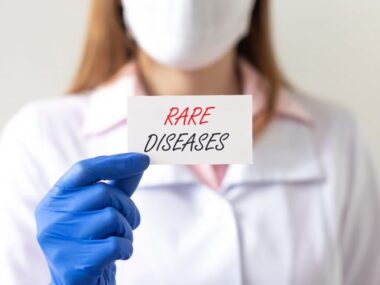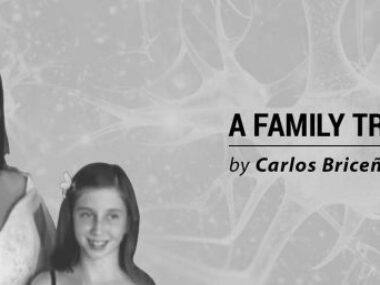The Squeaky Wheel Gets the Grease
Written by |

Dear people working to find a cure for Huntington’s disease (HD),
I imagine you all have various reasons for seeking a cure. Near the top of your list is probably a love for science and a challenge.
Or, perhaps you view HD like George Huntington, whose medical observations of people who exhibited spasmodic muscle movements, labeled chorea, led to him to publish a paper on the disease that later bore his name.
“I have drawn your attention to this form of chorea gentlemen, not that I considered it of any great practical importance to you, but merely as a medical curiosity, and as such it may have some interest,” Huntington wrote in 1872.
So, yes, medical curiosity is as good a reason as any to want to go down the rabbit hole that finding a cure requires.
I am thankful for whatever reasons, personal or professional, have led you here. I realize your job is an extremely difficult one. Finding a cure for HD, with all its ups and downs, seems to be as elusive as finding a needle in the ocean.
I have no doubt there are days you want to give up, or days when the sense of urgency is not as present. After all, HD is not COVID-19. During the height of the pandemic, Operation Warp Speed mentality gripped many researchers, scientists, and pharmaceutical companies, motivating them to develop a vaccine as quickly as possible, because hundreds of thousands of people were getting sick and dying.
There’s nothing like a pandemic to get a bunch of people to laser-focus and expeditiously find a solution to a terrible problem.
Although HD does not affect the same number of people or receive the same amount of news coverage as COVID-19, every second that ticks by brings my wife and daughter — both of whom are gene-positive for HD — and thousands of others around the world closer to a horrible end of life.
I know you’re trying your best to find a cure. I realize you probably need more funding. I have no doubt there is a huge lack of communication and collaboration between entities that, at times, probably hampers the growth necessary to make significant breakthroughs and advancements.
I’m writing this to say I wish I had the money and the influence to make your jobs easier, faster, and more efficient. However, I refuse to feel helpless. I’m a big believer in the saying “the squeaky wheel gets the grease.”
In looking over the HD landscape, I realize that what seems to be missing is a sense of urgency and a greater awareness of HD, especially compared with the quick response in creating the COVID-19 vaccine.
In the months ahead, I’ll be doing what I can, with the help of others, to generate a sense of urgency so that more people understand how many are dying from HD. We need to do more to stop this rare disease.
When a cure is found, it’ll be because enough people felt the same urgency at the same time. With that in mind, I look forward to doing what I can to help you all find a cure, and one of the biggest ways I can help is to channel my inner “wheel” and start squeaking.
Consider this column the first squeak.
Sincerely yours,
Carlos
***
Note: Huntington’s Disease News is strictly a news and information website about the disease. It does not provide medical advice, diagnosis, or treatment. This content is not intended to be a substitute for professional medical advice, diagnosis, or treatment. Always seek the advice of your physician or other qualified health provider with any questions you may have regarding a medical condition. Never disregard professional medical advice or delay in seeking it because of something you have read on this website. The opinions expressed in this column are not those of Huntington’s Disease News or its parent company, Bionews, and are intended to spark discussion about issues pertaining to Huntington’s disease.







Bernadette Barrett
I applaud you!! So if this was like Covid we would be better off in a way.
Carlos Briceño
I appreciate your applause. I don't wish COVID or HD on any one, but, as we have seen, COVID has made people aware of great suffering and pain through illness, and the response has been to put a full-court press to find a vaccine/cure. All rare diseases should be seen through that prism as they cause hundreds of thousands of people great pain and suffering too.
Juliana
Hello. My daughter is 4 at the moment, we didnt do any kind od tests, yet. My husband mother was HD positive, her sister, their mother...and every woman in the family. They all diedby the age of 43. I do not know much about this disease, but im very worried for my dauther.. We are not able to do any tests at the moment. My husband is 27y old, now.. He doesnt show any signs of the disease. His family tried to convince me that the disease was '' wiped off'' because my husband was born a male..and that there is no way he inherited the gene. What are the chances that he might be a gene carrier and my daughter have te disease? What should i do? Sorry for my bad English.
Carlos Briceño
I'm sorry to hear that HD runs in your husband's family. Just so you know, there is no "wiping out" the disease, in the sense that it is passed on through the genes. If someone in his immediate family had it, that means he has a 50-percent chance of getting it. The only way to find out if he has it is for him to take a genetic test. Some people don't want to know the answer. Ultimately, if you want to know the answer, I suggest he take the test.
Peggy Carlini
In reference to HD being genetic in families. My son was diagonised with HD at 48 years of age. We were dismayed as HD does not run in our families we have 8 brothers and sisters numerous aunts and uncles and cousins no one had even heard of this disease. At age 56 my son is in a nursing home Sitrin Neurocare in upstate N.Y. An excellent facility that specializes in 32 cases of HD and 2 Als cases. It is only for these rare conditions. Does anyone know the reason for ts mystery?
Carlos Briceño
Hello Peggy,
I am saddened to hear your son has been affected by such a horrible disease. As a parent, it is heartbreaking to see your child suffer in any way. I can’t answer your question with any medical reasoning, as I am not a professional. I can tell you that my wife’s family started showing symptoms at wildly different ages. Her grandfather passed away before showing any symptoms, which made her fathers siblings a little bit in the dark if they had inherited the gene. I have heard from others that their family members were diagnosed with other disorders because symptoms for HD are not the same for anyone. I spoke with a woman recently who said her aunt never showed a symptom until she was 81. There could be so many answers, and I hope you find what you are searching for.